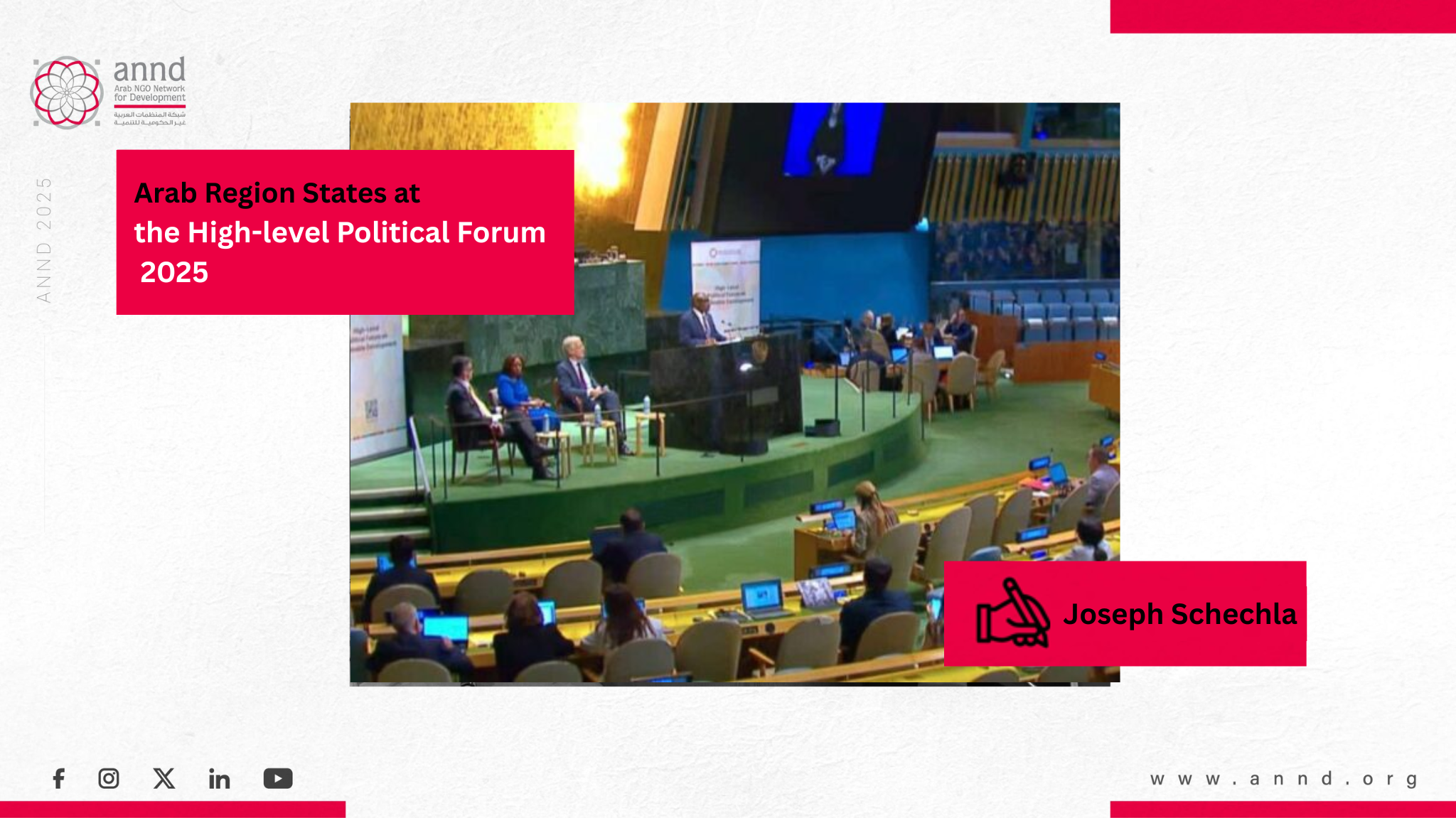
Arab Region States at the High-level Political Forum 2025 - Joseph Schechla
Joseph Schechla
Arab Region States at the High-level Political Forum 2025
- Joseph Schechla
This year, the UN’s High-level Political Forum reviewed three Arab states’ performance of the 2030 Agenda sustainable development policy. Iraq, Qatar and Sudan submitted their Voluntary National Reviews (VNRs) after Jordan and Palestine ultimately declined to submit their previously committed VNRs. Israel also submitted its VNR, but as a state member of the “Western European and Others” group of colonial-legacy states not confined to a particular geographic region.
Constituents of the three Women, Children and Youth and
Non-governmental Organization (NGO) Major Groups were the stakeholders most
actively engaged in the review process through the Major Groups and Other
Stakeholder (MGOS) coordination. Although no Arab NGO was physically present at
HLPF 2025, members of ANND and Habitat International Coalition platforms made
inputs and formulated oral statements for the plenary sessions.
However, despite repeated outreach to potential civil
society actors in both Israel and Qatar, none responded to repeated invitations
to cooperate in reviewing their countries’ part in the global pursuit of the
Sustainable Development Goals (SDGs).
Iraqi organizations commended their state’s VNR government
its commitment to the 2030 Agenda, calling for both “responsible investment”
and “social justice.” However, they reported that VNR-process consultations
with civil society were tokenistic, and omitted the complementary and binding
human rights obligations toward vulnerable groups such as women, internally
displace persons (IDPs), persons with disabilities, ethnic and religious
minorities, and to closing the gaps in fulfilling human rights to housing,
environment, health, and political participation.
They specifically objected to the VNR portraying the recent
Personal Status Law amendment as an achievement as misleading and ignoring
widespread feminist and civil protests, compromising the VNR’s credibility. The
local Sudanese development organizations found the VNR lacking by its disregard
of geographic and social disparities without remedial plans, especially where
conflict and/or climate change impacts impede development.
The remedy such shortcomings in the development process,
they argued for a tripartite—government, CS and private-sector—effort and
mechanism to draft, evaluate, and review development policy and outcomes
through a human rights lens, with data linked to improved SDG indicators with
community oversight.
Qatar’s VNR review was more positive in that an NGO MGOS
technical assessment found the report much improved over the largely pictorial
2019 edition. Qatar’s 2025 VNR was rich in statistical data and formed a rare
instance in which a state reported at all on progress toward 5.a: women’s equal
rights to economic resources, as well as access to ownership and control over
land and other forms of property, financial services, inheritance and natural
resources.” Uniquely, Qatar reported positively on the achievement of that SDG
target.
The Qatar VNR elaborated how the state and its agencies
drive development across all the SDGs. However, it also revealed an absence of
civil society, whereas, like in 2019, no Qatari civil actors has engaged with
the HLPF through any of the nine MGOS constituencies.
The Qatar VNR stressed the state’s extraterritorial
contributions to global humanitarian aid and sustainable development. In the
frame of the climate-action SDGs 1, 13 and 17, the MGOS speaker questioned
whether Qatar might also contribute to the UNFCCC Fund for responding to Loss
and Damage (FRLD). The delegation affirmed State of Qatar support to the Fund,
and the public now looks forward to that carbon-dependent state’s material
contribution.
In their written statement, the Sudanese organizations
assessed their state’s VNR as a “military government report,” rather than a
“national review.” They concluded that “Sudan’s hopeful transition in 2019 to
become a development state has vanished, as the army has plied its unyielding
hegemony over the people,” demonstrating failure across all SDGs. The MGOS
statement affirmed that their constituents continue to resist the present
governance of their country and emphasized that “development in Sudan cannot
happen without peace, justice and meaningful inclusion.” The characterized the
VNR’s disingenuous military-government message as one of acclaimed victimhood
uniquely due to the actions of the Rapid Support Forces, while it dared to use
the HLOF platform to beg for a global bailout. That message left the civil
actors to echo the VNR’s plea for international support not for the military
government,” but for the people freed of its domestic and extraterritorial
predators.”
As for Israel’s performance, the NGO MGOS spokesperson
characterized reading Israel’s VNR as a “dystopian exercise.” Its self-admitted
link to the “shadow of the war enforced on Israel” [p. 40.). He reminded the
Forum that, in 2019, stakeholders explained how Israel’s lopsided development
reflects two-tiered civil status: a superior class of “Jewish nationals” and
inferior status for mere “citizens.” He reminded, “Its apartheid-chartered
parastatal development institutions and their racist affiliates pursue
development and prosperity for settlers at the expense of the country’s
rightful owners, and all this amid democide, ecocide, attacking health systems
and industrializing starvation as a weapon of war.”
The VNR not only falsified the reporting state’s territory with maps and numbers, but simultaneously boasted to reduce the Indigenous Palestinian Arab proportion of the population by 2065 to under 20%. The VNR’s focus on technical advances masked their use as instruments of death, not development. Rather, he found Israel’s raison d’état and development project practicing sustainable genocide (i.e., inflicting maximum harm on the Indigenous Palestinian People in perpetuity, with a widening footprint across the region). The stakeholders forewarned that this state behavior will continue to harm all parties for generations yet to come.
Recent publications

